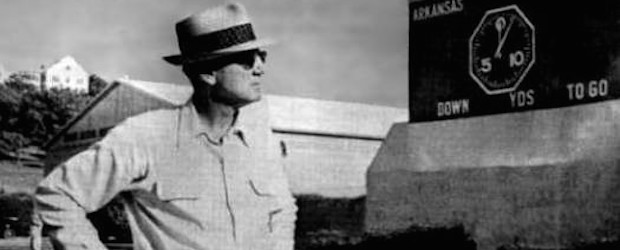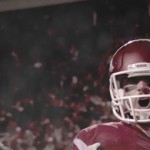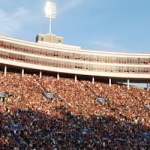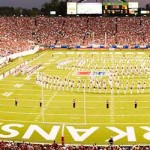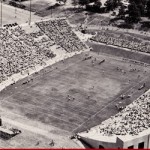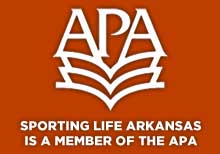Liberty Bowl Memorial Stadium
So Close to Putting Memphis
on Pro Football Map
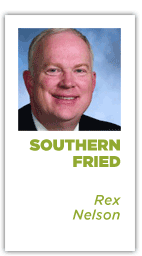 Clarence Saunders of Memphis, the founder of the Piggly Wiggly grocery store chain, owned a semiprofessional football team called the Saunders Tigers.
Clarence Saunders of Memphis, the founder of the Piggly Wiggly grocery store chain, owned a semiprofessional football team called the Saunders Tigers.
He proposed that a large football stadium be built at Memphis, thinking the city eventually could attract a National Football League team. What’s now the NFL had started in 1920 as the American Professional Football Association and changed its name to the NFL in 1922.
Saunders never achieved his football dream. He lost a fortune during the Great Depression, thus beginning decades of futility when it comes to the Bluff City and professional football.
The city did, however, get its new stadium.
In 1932, a group of business and civic leaders in Memphis presented the board of the Mid-South Fair Association with a plan to build a 25,000-seat stadium. The Memphis Park Commission gave its approval for a stadium at the fairgrounds that summer, but the plan was set aside in favor of a competing proposal at Central High School.
Construction of the stadium at the high school was completed by the WPA in 1934 with seating for 7,500 fans. The school board voted to name the stadium for former Mayor E.H. Crump, who continued to rule the city even after leaving the mayor’s office. He was known across the Mid-South simply as Boss Crump.
A 1936 game at Crump Stadium between Ole Miss and Tennessee drew a standing-room-only crowd of 11,000 fans, leading the city to remove the original wooden bleachers on the south side and replace them with concrete stands. That increased the capacity to 15,000. Control of the stadium was transferred from the school board to the Memphis Park Commission.
A release from the WPA said: “California has its Rose Bowl, Louisiana has its Sugar Bowl and now Memphis is to have its Cotton Bowl.”
Instead, a Texas oilman named J. Curtis Sanford funded the game out of his pocket, and the Cotton Bowl went to Dallas for its Jan. 1, 1937, inaugural.
Back in Memphis, 40 games (high school and college) were played at Crump Stadium in 1936. By 1939, the Crump Stadium capacity was 25,000.
The Delta Bowl was played there in 1948 and 1949. In 1947, the Arkansas-Texas game was played at Memphis. John Barnhill, the Arkansas athletic director at the time, moved the game to Memphis to make the point that a stadium with more seats was needed in Arkansas. When War Memorial Stadium opened the following year, the Crump Stadium manager (Allan Berry) was hired to run the new facility at Little Rock.
Ole Miss and Tennessee played each other at Crump Stadium until the 1960s. Mississippi State also was a regular visitor.
The city released plans in November 1962 to expand Crump Stadium to 45,000 seats, but that project fell by the wayside in favor of building a stadium at the fairgrounds to be known as Memphis Memorial Stadium.
Crump Stadium was transferred back to the school board when the new stadium opened in 1965. High school games were played there through 2004. The old stadium was torn down in 2006, and a new high school stadium that kept the Crump name opened in 2007 on the site. It retained the original outer brick wall, gates and entrances. The new stadium seats 7,000.
Other famous events in the history of Crump Stadium included a Billy Graham crusade in 1951 and an Elvis Presley performance in 1957.
Memphis Memorial Stadium was constructed at a cost of almost $4 million. It shared the Mid-South Fairgrounds with the Mid-South Coliseum and the Libertyland amusement park. The first regular-season game in the stadium was between Ole Miss and what’s now the University of Memphis.
Liberty Bowl founder Bud Dudley moved his game from Atlantic City to Memphis that year, where it has remained. The stadium was renamed Liberty Bowl Memorial Stadium in 1976.
In 1987, a renovation project increased the stadium’s capacity from 50,160 to 62,380. Another renovation project two years ago decreased capacity to 59,308. Changes since the last time the University of Arkansas played in the Liberty Bowl in 2009 include new lights, two new video boards, new elevators, new turf and extensive painting.
In addition to hosting the Liberty Bowl each year, the stadium has hosted the Southern Heritage Classic since its inception in 1990. Tennessee State and Jackson State draw about 50,000 fans for that game, ranking it in the top three in attendance among historically black college football classics.
The University of Memphis has played home games at the stadium since 1965 after having played 28 seasons at Crump Stadium.
And it seems as if almost every professional football league has called the Liberty Bowl home at one time or another.
During the 1974-75 seasons, the Memphis Southmen of the World Football League played there and drew good crowds. Owner John Bassett changed the name of the team to the Grizzlies and made a bid to join the NFL as a 1976 expansion team. More than 40,000 season tickets were sold in the Memphis area. The NFL refused to add Memphis. Bassett filed a lawsuit against the NFL that was dismissed.
The best Memphis could do from 1978-80 was a North American Soccer League team known as the Rogues. That team moved to Calgary after the 1980 season.
Bassett had hooked up to start the league with Gary Davidson, who helped start the American Basketball Association and the World Hockey Association, which later were absorbed by the NBA and the NHL. Bassett was a Canadian tennis prodigy who came from a wealthy family and went on to become a movie producer. He owned the WHA’s Toronto Toros, and his family owned the Toronto Argonauts of the Canadian Football League, two Toronto newspapers and several television stations.
His WFL football team in Toronto would be called the Northmen. Canadian Prime Minister Pierre Trudeau announced that under the Canadian Football Act, no U.S.-based football league would be allowed into the country to compete with the Canadian Football League. So Bassett moved the team to Memphis.
The 1974 home opener against Detroit drew 30,122 fans. Elvis Presley was there to watch, and Arkansas native Charlie Rich sang the national anthem.
Rich sat down next to Presley at the start of the game, and Presley said: “That’s a tough song to sing, ain’t it?
Rich replied: “It ain’t no Behind Closed Doors.”
For the rest of the story, click here…


